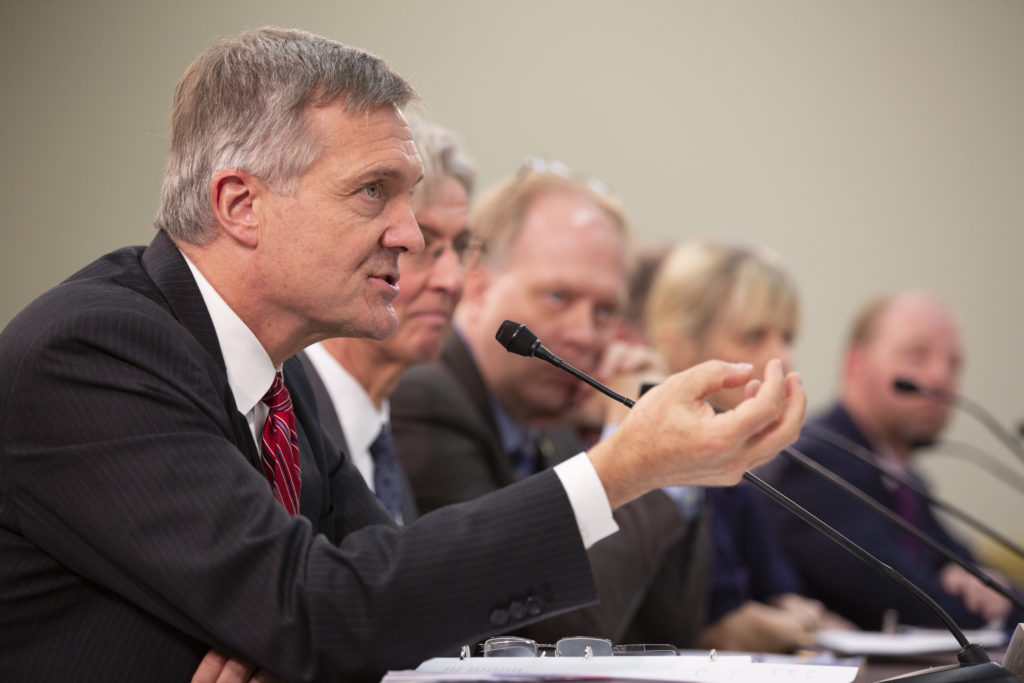
NRECA CEO Jim Matheson told a House Energy and Commerce subcommittee on Wednesday that diversity of electric generation options, including baseload sources, is essential to meeting co-op members’ expectations in a carbon-constrained economy.
Electric co-op members can ill afford energy cost increases during the transition to a lower carbon electric portfolio, Matheson said. That and other factors “make it especially important for co-ops to keep electric rates affordable, maintain reliability and improve sustainability as they explore all ideas to meet the evolving energy needs of their communities.”
Matheson urged lawmakers to recognize that co-ops need a diverse mix of fuels—including coal and natural gas—to provide affordable electricity to rural communities in high-poverty areas. “Knowing that both coal and natural gas will continue to play an important role in providing affordable and reliability electricity in a carbon-constrained future, electric co-ops are actively engaged in carbon capture research and development,” he said.
Testifying before the committee on which he served for eight years, Matheson discussed steps that electric co-ops have taken to expand and diversify their generation portfolios. From 2009 to 2016, the share of renewable energy that electric co-ops provided to their members increased from 13% to 17%.
Carbon dioxide emissions from cooperative-owned generating facilities dropped 12% from 2005 to 2017 as they increased energy efficiency and replaced some coal-fired power plants with lower-emitting natural gas plants or renewable energy, he said. Co-ops’ solar capacity alone has more than quadrupled since 2016.
“Every cooperative’s resource mix is unique to the needs of that co-op and will continue to vary greatly depending on existing resources and assets, the impact on electricity costs for its member-consumers, reliability implications, and the availability of alternative electric generation,” he said.
Matheson was one of six witnesses testifying at a hearing titled “Building a 100 Percent Clean Economy: Solutions for the U.S. Power Sector.” The power sector produces about 28% of America’s total greenhouse gas emissions, making it the second-largest source after the transportation sector, committee leaders said.
Committee Democrats announced in July that they want to pursue legislation to zero-out all carbon dioxide emissions from the U.S. economy by 2050.
Matheson noted that the Department of Energy recently chose NRECA—in partnership with the Pacific Northwest National Laboratory—to research small-scale, community-based wind energy solutions that can be deployed by co-ops.
“Interest among electric co-ops in deploying energy storage is also growing and should accelerate as more experience is gained, costs decline, and battery performance improves,” Matheson said. “Hydropower and nuclear energy also remain an essential source of zero-emission generation for electric cooperatives in certain regions.”
Forcing co-ops to prematurely shut down coal-fired plants or natural-gas facilities would raise rates for consumer-members, many of whom can’t afford to pay more, he said.
Matheson encouraged lawmakers to visit their local co-ops to better understand their unique situations.
“A technology, program or policy that works for one co-op might not work for another,” he said. “Having the flexibility to implement energy solutions across the many regions where cooperatives serve is a critical factor today and for the future of our members.”
Matheson urged lawmakers to “ensure that any proposals that this committee considers provide long-term certainty and flexibility that maintains energy diversity for electric co-ops, supports reliability of the electric grid and minimizes undue harm for consumers.”